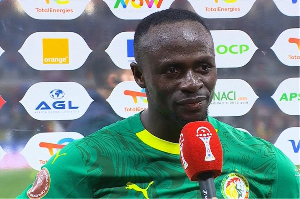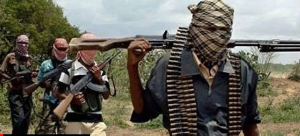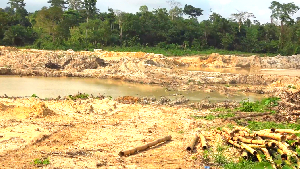Several weeks after the International Monetary Fund (IMF) mission's visit, officials are still tight-lipped over the conclusions of that mission and exactly which donor conditions government has accepted.
The donors' main concern is how the government is going to finance the hole in the budget. Government's expenditure is also a matter of concern as over the years government spends more than they budget for. Public Agenda learnt the IMF has brought someone to check this.
The Ministry of Finance has denied that IMF technocrats currently attached to the Ministry are in town to supervise Ghana's budget.
"What we did was to ask for technical assistance, but they are not here to supervise our budget. They are just helping us [ ] it is normal," says the deputy Minister of Finance, Adonbila Agambila, in an interview with Public Agenda. "As an IMF-member country, we have the right to ask for technical assistance, especially in expenditure management and control",
But this denial has done little to defuse speculations that the Bretton Woods institutions are baby-sitting the Ministry of Finance to ensure that discipline is injected into Ghana's fiscal policy.
Ghana's economy continues to be tethered to the intravenous tubes of international donor support, creating a dependency syndrome that experts say could be worrying to the country's development programme.
Both the Government of Ghana and the IMF/World Bank insist that the international financial institutions have ceased imposing stereotyped conditions on the country, but the usual guideposts are still evident: rigid economic policies, good governance and structural reforms.
Talking about structural reforms raises the sticky issue of privatising some blue-chip state-owned enterprises like the Ghana Commercial Bank (GCB). The donor community wants the divestiture of GCB to be put on the fast track.
However, the Minister of Finance, Yaw Osafo Maafo has stated at several forums that, even though in principle he has no objection to privatising GCB, he is against the closing down of branches of the bank, particularly in the countryside where GCB offers the only means of banking services.
Other concerns raised by the IMF in its new dealings with the Government cover the creation of a stable macro-economic environment through prudent revenue and expenditure policies to reduce inflation and interest rates.
The IMF Resident Representative in Ghana, Girma Begashaw, told Public Agenda that the fund has requested the government to come out with revenue and expenditure policies that will address financing the gap of ?2.6 trillion in the 2001 interim budget without resorting to printing of money to aggravate the inflationary pressures on the economy.
He said the Government is also expected to ensure a stable exchange regime and come out with privatisation agenda that will take a look at off-loading government's interest in Coca-Cola, Ghana Commercial Bank and GIHOC.
"Disposing of share ownership in these enterprises on the stock exchange is very important to help generate funds to close the huge hole in the budget," he said.
The Ministry of Finance responded to this with revenue enhancing measures that included introduction of national reconstruction levy, airport tax, increase in the VAT threshold and fees charged by government agencies.
The IMF says now it expects countries appearing before its board to prepare their own country programme indicating macro-economic targets and how to achieve them. The main thrust of such programmes is on how to bring down inflation, reduce interest and the establishment of a stable exchange rate regime.
The rapid response from the donor community with grants being extended to Ghana as a result of the country joining the Highly Indebted Poor Country (HIPC) initiative is also raising a few eyebrows.
The Paris Club is yet to meet to set a cut-off date for Ghana's debt as required under the "Decision Point" phase of HIPC, but the country is already enjoying benefits under the initiative. There have been inflows already, and ?2 trillion of the country's external debt due for payment this year is expected to be written off in July.
This represents the minimum ceiling to be cancelled, and according to the Finance Ministry, it could be increased if the country is successful in wooing its bilateral partners at the Paris Club meeting next month.
So far, the European Union (EU) has announced that it would be extending to Ghana a grant of 40 million Euro (about ?25 billion) for budgetary support. Over the next four years, the EU will extend a further grant of 231 million Euro (about ?145 billion) to support Ghana.
Curious observers are wondering what might have triggered this inflows. Agambila says the government hasn't done anything extraordinary beyond the goodwill that the country is enjoying at the moment.
"Development partners appreciate the transparency and openness with which we are sharing information with them", he stress.
Since the HIPC began in 1996, it has come under fire for requiring so many conditions that the process took years, and the countries' economies came under even more pressure in the intervening period. Five years after HIPC was launched, only four countries have actually received debt relief, according to World Bank figures, namely Bolivia, Uganda, Guyana and Mozambique.
The apparent short-circuiting being adopted to assist Ghana is therefore leading observers to question whether the government is not giving too much away to the demands of the IMF.
But Agambila counters "Some of the donors didn't allow flows into Ghana last year because what they wanted to see weren't there." According to him, when delegates from the World Bank visited Ghana in November last year, they realised that there has been a lot of slippage in the running of the IMF program.
"We didn't meet our targets at the time", he explained. "This year we asked them why should they hold a new government responsible for the mistakes of our predecessor".
The Deputy Minister for Finance said in 1999, the IMF set about 12 benchmarks for Ghana but eight were waived to enable the country get on the Funds programme otherwise nobody was ready to give Ghana money.
He cited some of the waivers as the Net Domestic Finance, which covers borrowing from the domestic banking system; the Reserve Money target; and the Actual Revenue and Grants target.
General News of Monday, 11 June 2001
Source: Franz Vanderpuye












